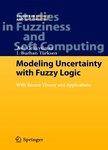版权所有:内蒙古大学图书馆 技术提供:维普资讯• 智图
内蒙古自治区呼和浩特市赛罕区大学西街235号 邮编: 010021

丛 书 名:Studies in Fuzziness and Soft Computing
版本说明:1
I S B N:(纸本) 9783540899235;9783642100635
出 版 社:Springer Berlin Heidelberg
出 版 年:1000年
页 数:XLVIII, 400页
主 题 词:Computer-Aided Engineering (CAD, CAE) and Design Mathematical and Computational Engineering Artificial Intelligence
摘 要:The world we live in is pervaded with uncertainty and imprecision. Is it likely to rain this afternoon? Should I take an umbrella with me? Will I be able to find parking near the campus? Should I go by bus? Such simple questions are a c- mon occurrence in our daily lives. Less simple examples: What is the probability that the price of oil will rise sharply in the near future? Should I buy Chevron stock? What are the chances that a bailout of GM, Ford and Chrysler will not s- ceed? What will be the consequences? Note that the examples in question involve both uncertainty and imprecision. In the real world, this is the norm rather than exception. There is a deep-seated tradition in science of employing probability theory, and only probability theory, to deal with uncertainty and imprecision. The mon- oly of probability theory came to an end when fuzzy logic made its debut. H- ever, this is by no means a widely accepted view. The belief persists, especially within the probability community, that probability theory is all that is needed to deal with uncertainty. To quote a prominent Bayesian, Professor Dennis Lindley, “The only satisfactory description of uncertainty is probability.